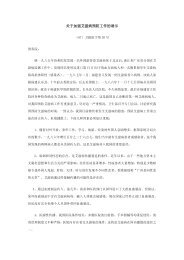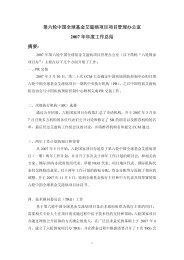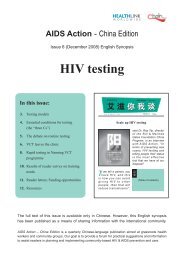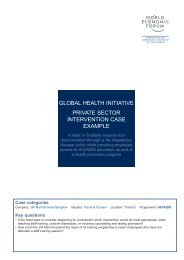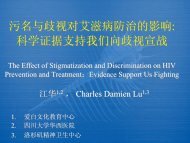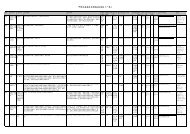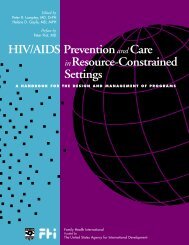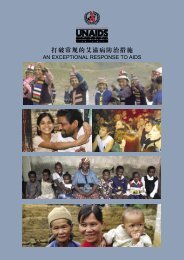The Training of Trainers Manual - UNFPA
The Training of Trainers Manual - UNFPA
The Training of Trainers Manual - UNFPA
You also want an ePaper? Increase the reach of your titles
YUMPU automatically turns print PDFs into web optimized ePapers that Google loves.
Handout 3 • HIV/AIDS Quiz 3<br />
Questions<br />
1. What does AIDS stand for<br />
2. What does HIV stand for<br />
3. Can you get HIV from kissing<br />
4. ‘You can catch AIDS from sharing infected needles’. Is there anything wrong with this statement<br />
Answer yes, no, or I don’t know. If you answer yes, explain what is wrong with the statement.<br />
5. What does it mean if someone is diagnosed as HIV-antibody positive (HIV+)<br />
6. How can HIV be transmitted from mother to child<br />
7. In the context <strong>of</strong> testing for HIV, what do we mean by the ‘window period’<br />
8. <strong>The</strong> HIV virus cannot survive outside the body. True or false<br />
9. Why does anal sex carry more risk <strong>of</strong> HIV transmission than other kinds <strong>of</strong> sex<br />
10. You cannot get HIV infection from giving blood with sterile syringes. True or false<br />
Correct answers<br />
1. Acquired immunodeficiency syndrome<br />
2. Human immunodeficiency virus<br />
3. Kissing only carries a risk if there is an exchange <strong>of</strong> blood from an HIV+ person to his or her partner.<br />
This can occur when the skin or mucous membranes in or around the mouth are damaged.<br />
4. <strong>The</strong> statement is wrong: you contract HIV (the virus), but not AIDS.<br />
5. It means that the white blood cells have produced antibodies in reaction to the presence <strong>of</strong> HIV in<br />
the bloodstream. It proves that the person is infected with HIV. However, the antibodies cannot kill<br />
the virus!<br />
6. During pregnancy, delivery, and breastfeeding.<br />
7. HIV antibodies usually take between two and three months to appear in the bloodstream. This<br />
period is called the ‘window period’, during which an infected person will test negative, even if she<br />
or he has the virus and is infectious.<br />
8. True.<br />
9. <strong>The</strong> rectum bleeds easily, allowing blood to mix with semen carrying HIV.<br />
10. True.<br />
Section 4. Participant Handouts<br />
137



